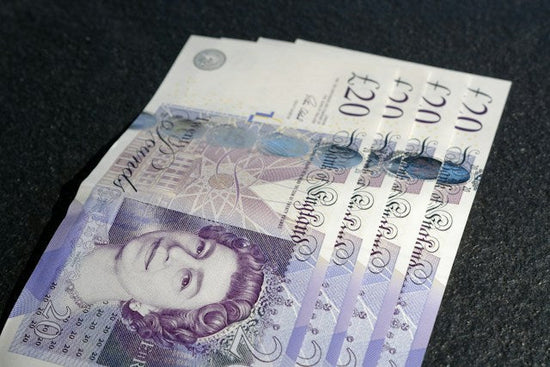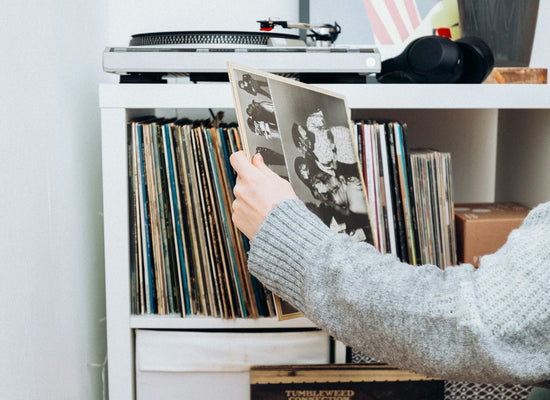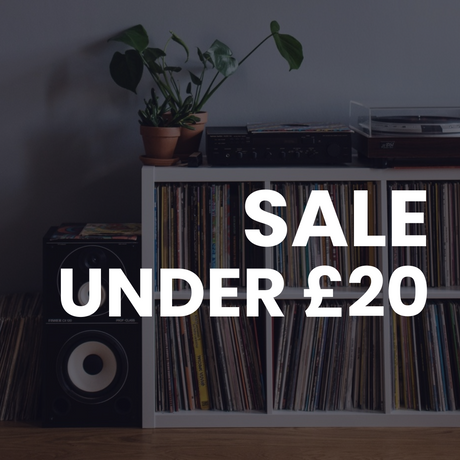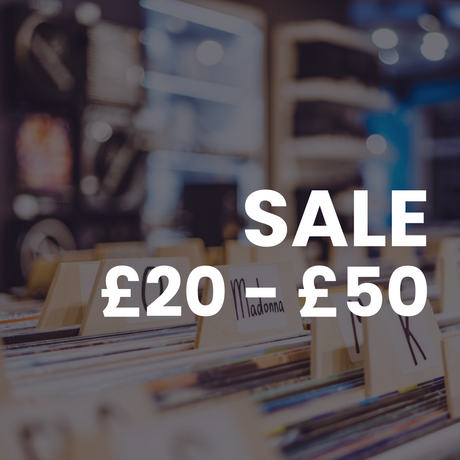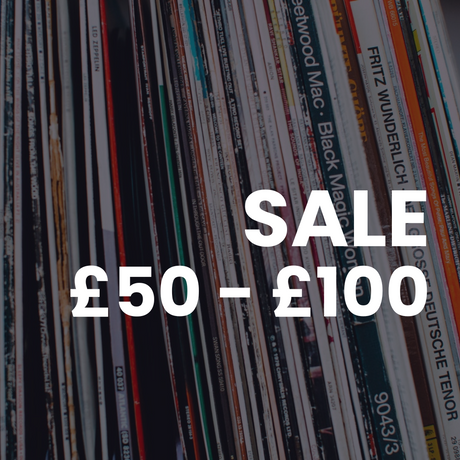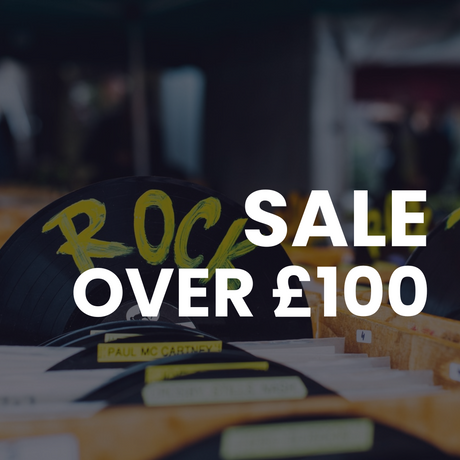Whether you're a seasoned collector looking to cash in on your prized collection or just starting and wondering if that dusty crate in the attic holds hidden treasures, you're in the right place.
In this guide, we'll cover everything you need to know about determining the value of your vinyl records and navigating the process of selling them. From grading and pricing to finding the right marketplace, consider this your go-to resource for turning your vinyl into cash.
Prefer for someone else to do all the hard work? Sell your collection to us today.
How To Value Vinyl Records
Getting the prices right is important and will vary hugely depending on the release and condition. You will need to research the market value of your records to set competitive prices.
Identify Variant & Rarity
Identifying the pressing variant of a record is essential for accurately assessing its value. Pressing variants can significantly impact a record's desirability and market value, as different pressings may have unique characteristics or be associated with specific editions or releases.
To identify the pressing variant of a record, you will need to examine the record's label, matrix/runout codes, and other identifying marks, which can provide clues about the record's manufacturing origin and production run. Consulting online resources, discography databases, and reference books specific to the artist or record label can also help collectors identify and differentiate between pressing variants.
There are some good websites specific to artists like The Beatles and The Rolling Stones, but the very best site for identifying all records is Discogs. The best place to start is a search on Discogs for the catalogue number and the matrix information.

How To Search
For example, a search for this copy of Meddle by Pink Floyd would look like something like SHVL795A-7 HTM SHVLB-6. This search will bring up only a handful of results (compared to over 60 UK pressings if you search using just the catalogue number) which makes identifying your exact pressing much easier.
Did you know? The ‘HTM’ in this matrix etching refers to Harry T Moss, the mastering engineer who mastered this pressing of this record. You can learn more about him in our post about what HTM means.
Special Editions & Extras
Some records are released with extra items, like posters or signed prints. Others would have been released in limited numbers (these will often have the number printed on them) or on 180g heavyweight vinyl.
These features are important to take note of and consider when deciding on a value – it will often mean that the record is more sought after. Extras like posters, prints or the original hype sticker will always boost the value of the record if they are present and in nice condition. It’s also important to take note of when a record is missing an extra item that it would have come with originally.
For example, a first press of Sgt Pepper’s Lonely Hearts Club Band by The Beatles is significantly more valuable when it comes with its original psychedelic inner sleeve and green ‘cut-outs’ insert. Check out our post about how to identify The Beatles first presses.

Evaluate Condition
Evaluating the condition of a record, also known as grading, involves assessing various factors to determine its overall state and value. Commonly used grading systems include the Goldmine Standard and the Record Collector Grading System, which consider criteria such as record shine, surface noise, scratches, warping, and sleeve condition.
By carefully examining these aspects, you will be able to assign a grade ranging from Mint to Poor, providing potential buyers with an accurate representation of the record's condition before purchase.
Many buyers will only be interested in records graded Very Good and higher, with some collectors being even more particular and only looking for records graded Excellent or higher.
Getting your grading correct is vital when selling records.
You can learn more about exactly how to grade your records in our dedicated Grading Guide.
Research Sales
Now that you know exactly which record you have in your hands, you can look at deciding how much to list it for. Start by researching recent sales of similar records on platforms like Discogs, eBay and Popsike. Remember to look at sold prices – there is often a big difference between what sellers list items for, and what they sell for.
By analysing recent sales of similar records in comparable conditions you will be able to gauge market demand and pricing trends to determine a fair and competitive selling price for your records. Additionally, consulting price guides and auction results can provide valuable insights into the value of specific records.
One well-known price guide is Record Collector’s Rare Record Price Guide, which is published twice a year. The book only lists the value for a copy of each record in Mint condition, however, which most records are very unlikely to be. The value of a record can quickly come down to less than half of the value it may be described as in this book.
While it sounds nice to be able to value your records from print, we would always recommend real, recent online sales data for getting the most accurate prices for your records.

Consider Demand
Considering demand is crucial when valuing vinyl records, as it directly influences their market value. You will need to assess the level of demand for specific records by researching trends, observing bidding activity on online marketplaces, and consulting with other collectors and experts in the field. Factors such as the rarity, popularity, and cultural significance of a record can all impact its demand.
Additionally, it is advisable to consider the current market conditions, including fluctuations in demand due to seasonal trends, reissues, or renewed interest in specific genres or artists. For instance, the end of November is a brilliant time to list some Christmas records!
Supply & Demand
The more popular a release is, or was at the time of release, the less value any pressings of it might have. This is entirely related to supply and demand – if an artist is incredibly popular, the market will be flooded with copies of their records and therefore they are available to everyone at whatever price they like. The price will continue to drop – every seller is simply competing to manage to make that sale.
On the other hand, many more niche releases were pressed in smaller numbers and have since seen a higher demand, which allows sellers to list for higher prices and be one of a handful of people selling that record.
A brilliant example of this is ‘Ain’t No Van Gogh’ by Silent Movies, released in 1979. They were a punk/indie rock band from our area, in Somerset. We’ve acquired two copies of this single from local sellers and the rarity of the release means that we’re currently the only seller who has any complete copies listed.
Just Don’t List It!
There will be times when there are so many copies of a record available online, that it simply isn’t worth trying to sell. Be aware of when there are hundreds available but only a handful or even zero sales in the last couple of years – these are records that will probably sit on your shelves forever if you list them online.
Remember that your time is valuable, and sometimes it will be better to give a record away for free than putting the effort into listing a record that will never sell.
How To Sell Vinyl Records
Selling records yourself through online marketplaces, record fairs or through other methods offers a convenient way to reach a wide audience of potential buyers.
There are several popular online marketplaces for selling records, including eBay, Discogs, and Vinted. You could even sell your records on Facebook or Instagram. Each platform has its own set of features, fees, and user base, so research and choose the one that best fits your needs.
There are also ways to sell your products across multiple/all platforms which will offer you the most reach, but this can be a complicated process and we would only recommend it if you were looking to start a more fully formed record business, with its own website and branding.
Listings
When preparing listings for your vinyl records, it's important to provide comprehensive details that accurately depict the condition and characteristics of each item. This includes essential information like the artist's name, album title, release year, record label, genre, and catalogue number, as well as details of any extra items or features that come with (or that are missing from) the record.
Grading
You will also need to include a description of the record's condition, following recognised grading standards such as those set by Record Collector, as discussed previously. This is also your opportunity to advertise exactly how you have looked after and graded the record. Have you play-tested the record, has it been cleaned, and does it have any notable scratches or damage?
Images
Additionally, supplementing your listings with high-quality photographs will significantly enhance the visual appeal and desirability of your records, capturing the attention of potential buyers and encouraging them to make a purchase. Here is some advice from eBay about taking good listing photographs.

Pricing
Getting the prices right is important and will vary hugely depending on the release and condition. You will need to research the market value of your records to set competitive prices. Look up recent sales of similar records to gauge what buyers are willing to pay. The best places to research recent sales are eBay, Discogs and Popsike.
Important: remember to look at sold prices – there is often a big difference between what sellers list items for, and what they sell for.
If you sell on eBay, you could list your items as auctions. This allows for them to sell for ‘what they are worth,’ but does come with a risk of them selling for less than you had hoped. eBay auctions are best suited to highly sought-after artists, like The Beatles or The Rolling Stones. This is because more people will be looking for their records, meaning you’ll have more people bidding against each other to purchase your records.
Managing Your Stock
The work doesn’t end with listing the product online – you’ll need to keep track of your listings and manage them regularly to ensure they remain accurate and up to date. We would recommend relisting items that haven't sold after a certain period, or readjusting prices based on market trends.
Storage is also a key point to consider. You'll want to have a plan as to how you are going to store and protect the records that you currently have for sale so that they don't become damaged before (or even after) an order is placed. We've written a dedicated guide on the best ways to store your records. Hopefully, it will give you some inspiration!

Communication with Buyers
It’s important to be responsive to enquiries from potential buyers and provide prompt and helpful replies to their questions. Clear communication can help build trust and confidence in your listings, leading to successful sales, and repeated sales.
Shipping and Packaging
When a record sells, carefully package it to prevent damage during postage. Use appropriate packaging materials, such as sturdy mailers or cardboard boxes designed for vinyl records and consider adding extra padding or bubble wrap for added protection.
Ship promptly (we would recommend shipping within one business day) and provide tracking information to the buyer to ensure a smooth transaction.
Check out our post about how to package and ship records!

Feedback
Building a positive reputation as a seller is important for attracting buyers and encouraging repeat business. Provide excellent customer service, accurately describe your items, and ship orders promptly to earn positive feedback from buyers.
Does this sound like a lot of work?
If you've decided that perhaps selling your records individually through marketplaces isn't for you, then how about getting in touch with us?
We buy collections large and small from all over the UK, and we'd be very happy to hear from you.
Frequently Asked Questions
Does anyone buy 78 RPM (shellac) records?
There are some collectors and enthusiasts who buy 78 RPM shellac records. While the demand for them is significantly smaller than vinyl records, there is still a market for some releases among those interested in vintage music and historical recordings. Some collectors seek out specific genres or artists, while others may be interested in records from a particular era or with unique labels. Here at Atlas Records, we only buy and sell vinyl records.
How do I find out what my vinyl records are worth?
Determining the value of vinyl records involves researching recent sales of similar items, evaluating the condition of your records, and considering factors like rarity, demand, and pressing variants. Consulting online marketplaces, price guides, and experienced collectors can also provide valuable insights into the market value of your vinyl records.
Is it worth selling vinyl records?
Selling vinyl records can be worth it if you have records that are in demand or have significant value. Researching their worth, considering factors like rarity, condition, and demand, can help you determine if selling your vinyl records will yield a satisfactory return on investment. Additionally, selling records can declutter your space and provide extra cash for other purchases or investments.
Is there an app to find the value of vinyl records?
Yes, there are several apps available for both iOS and Android platforms that can help you find the value of vinyl records. Some popular ones include Discogs and Popsike. These sites allow users to search for specific records, view pricing information based on recent sales data, and track their vinyl collection's value. Read our blog post about vinyl record apps.
What is a fair price for vinyl records?
The price of vinyl records can vary widely depending on factors such as rarity, condition, artist popularity, and demand. Generally, common albums in good condition might sell for £5 to £30, while rare or collectable records could fetch hundreds or even thousands of dollars. It's essential to research recent sales of similar records to determine a fair price for buying or selling.
What is the easiest way to sell vinyl records?
The easiest way to sell vinyl records is to sell to a local record shop, all in one go. If you want to maximise your income, you can sell through online marketplaces like eBay, Discogs, or Etsy, where you can create listings and reach a wide audience of potential buyers. Sell to us.





